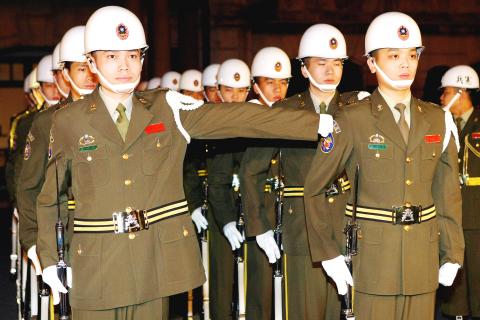The Presidential Office is probably the most heavily guarded government agency in Taiwan and the most mysterious. Every visitor wishing to enter the century-old building must obtain permission beforehand or be guided by designated personnel. Even reporters can go to only two places in the building: the press room and the restroom.
There are four battalions protecting the Presidential Office building. The presidential guards, or “iron guards” (鐵衛隊), form the inner-most circle of the protection shield.
A battalion commander, Chang Yao-yuan (張耀元), said the presidential guards are members of the 211th Battalion of the military police.

Photo: CNA
The battalion was established on Dec. 1, 1956, but back then they were called the “guest house guards” because they were stationed at the Taipei Guest House, which is only one block away from the Presidential Office. When duty called, they would march from the Taipei Guest House to the presidential building.
In 1991, the “guest house guards” were relocated to the Presidential Office building and renamed the “iron guards.”
Chiang Chih-huai (姜智懷), an “iron guard,” was extremely shy and uneasy in front of the cameras when he talked to the press before the Lunar New Year. He said he was more nervous facing the media than talking to the president.
The reason that he decided to join the “iron guards” was mere curiosity, he said. Standing at 185cm tall, the 25-year-old said he was asked if he was interested in joining the team the first day he began his compulsory military service. He thought it was a once-in-a-life-time chance so he decided to give it a try. The training was hard and there was a lot of pressure, but he did not regret it because the “iron guards” are the creme de la creme of the military police, he said.
To be selected as an “iron guard,” potential candidates must have a perfect stature and must stand at least 180cm tall and weigh at least 80kg.
They must also go through a long and strict background check that includes screening their family members, checking for any criminal record and scrutinizing their academic performance.
Half of the 41 “iron guards,” must get up at 5am to get ready for the daily flag-raising ceremony, while the rest can sleep in until 6am. Their daily routines include flag raising, practicing parade steps and standing guard.
“Iron guards” are stationed at the front gate, west gate and entrance hall of the presidential building. While regular visitors enter the building from the back gates, the entrance hall is open to invited guests only.
Each “iron guard” must exercise at least once a day to keep fit and healthy.
They are required to do at least 50 push-ups and 44 to 46 sit-ups in two minutes. They must also finish a 3,000m run in 15 minutes. Physical training is conducted three times a day: first thing in the morning, at 4pm in the afternoon and after finishing dinner in the evening.
Chiang said he does not have much interaction with the president when he is on duty, but something happened recently that touched his heart.
“It has been very cold lately. One time after the president got out of his car, he asked me and my colleagues standing guard at the front gate whether we were cold and if we were dressed warm enough,” Chiang said.

The Ministry of Education (MOE) is to launch a new program to encourage international students to stay in Taiwan and explore job opportunities here after graduation, Deputy Minister of Education Yeh Ping-cheng (葉丙成) said on Friday. The government would provide full scholarships for international students to further their studies for two years in Taiwan, so those who want to pursue a master’s degree can consider applying for the program, he said. The fields included are science, technology, engineering, mathematics, semiconductors and finance, Yeh added. The program, called “Intense 2+2,” would also assist international students who completed the two years of further studies in

Former president Tsai Ing-wen (蔡英文) departed for Europe on Friday night, with planned stops in Lithuania and Denmark. Tsai arrived at Taiwan Taoyuan International Airport on Friday night, but did not speak to reporters before departing. Tsai wrote on social media later that the purpose of the trip was to reaffirm the commitment of Taiwanese to working with democratic allies to promote regional security and stability, upholding freedom and democracy, and defending their homeland. She also expressed hope that through joint efforts, Taiwan and Europe would continue to be partners building up economic resilience on the global stage. The former president was to first

Taiwan will now have four additional national holidays after the Legislative Yuan passed an amendment today, which also made Labor Day a national holiday for all sectors. The Chinese Nationalist Party (KMT) and Taiwan People’s Party (TPP) used their majority in the Legislative Yuan to pass the amendment to the Act on Implementing Memorial Days and State Holidays (紀念日及節日實施辦法), which the parties jointly proposed, in its third and final reading today. The legislature passed the bill to amend the act, which is currently enforced administratively, raising it to the legal level. The new legislation recognizes Confucius’ birthday on Sept. 28, the

MORE NEEDED: Recall drives against legislators in Miaoli’s two districts and Hsinchu’s second district were still a few thousand signatures short of the second-stage threshold Campaigners aiming to recall Chinese Nationalist Party (KMT) legislators yesterday said they expect success in 30 out of 35 districts where drives have passed the second-stage threshold, which would mark a record number of recall votes held at once. Hsinchu County recall campaigners yesterday announced that they reached the second-stage threshold in the recall effort against Legislator Lin Szu-ming (林思銘). A total of 26,414 signatures have been gathered over the past two months, surpassing the 10 percent threshold of 23,287 in Hsinchu County’s second electoral district, chief campaigner Hsieh Ting-ting (謝婷婷) said. “Our target is to gather an additional 1,500 signatures to reach